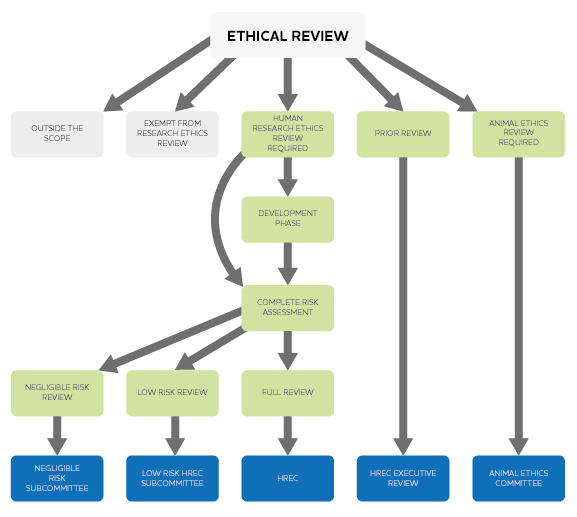All research ethics applications will be reviewed in a new online system. More on these online reviews can be found below.
In accordance with the National Statement on Ethical Conduct in Human Research 2023 and the Australian Code for the Care and Use of Animals for Scientific Purposes and other relevant codes and standards, the University has established a proportional review framework, which matches the process, documentation, length and rigour of the review to the risks and ethical sensitivity of the planned work.
All research and research-related activity should be tested in the Proportional Review Checklist (even if you know ethics review is not required). By answering some brief questions about your planned activity, the Checklist will determine whether the activity requires review and the most appropriate review pathway. Alternatively, your project may qualify for an ‘Out of Scope’ or ‘Exempt from Review’ notification.
Enter the ECU Research Ethics Management System and complete the Proportional Review Checklist.
If you are a student and working on a research project that aligns with your supervisor’s research project or another research project, to avoid duplication of ethical review, Research Services have developed a simple guide for determining how your research should be reviewed.
Please note that REMS is best accessed using Chrome or Firefox browsers. Do you have staff and student profiles? See how to manage multiple log-ins in Office 365 with Chrome.
All animal research project must first be checked within the Proportional Review Checklist. If your work requires full animal ethics review you will receive an automated email notifying you of this decision and taken to STREAM where you will complete your application. Visit the applying for animal ethics approval web page for more information, if notified by the Proportional Review Checklist.
Please note that if your proposed project involves Aboriginal and Torres Strait Islander people or recruitment of a greater than the normal population of Aboriginal or Torres Strait Islander people, the Research Ethics Team will seek additional input from the Centre for Indigenous Education and Research, Kurongkurl Katijin prior to review by the HREC to ensure the cultural considerations have been addressed. This may require you to make amendments to your submitted application prior to HREC review. As such projects of this kind may require a longer lead time in order to meet Committee agenda deadlines.
The Proportional Review Checklist
The first stage of the ethics review process is to complete the Proportional Review Checklist (PRC). The PRC is divided in to seven sections, with each designed to determine whether your project requires review and if it does, the proportional review pathway under which it should be reviewed.
For further information on the Proportional Review Checklist, see the Understanding the Proportional Review Checklist web page.
My research activity requires review – how do I apply?
Once you complete the PRC you will be notified of the appropriate review pathway for your research by email. In this email you will be provided with a link to a Microsoft Team site to facilitate collaboration with your research team in preparing your application, and a link to the application form. You can also access your application form and Team site through your REMS portal .
Please see the narrated PowerPoint presentation that shows you how to complete your research ethics application in Microsoft Teams.
Review of Research Ethics Applications
Your human or animal research ethics application will be reviewed by one of four review committees at ECU. A preliminary review of your application will be conducted by the Research Ethics Team at which time you may be prompted for additional information or attachments. These will need to be uploaded to your Microsoft Team site.
Once ready for review, the Research Ethics Team will assign reviewers or add your application to the next HREC meeting agenda (if applicable). At any time, a reviewer or review committee reserve the right to escalate an application for more rigorous review.
All research ethics applications will be reviewed online from June 2020. You may be asked to participate in a pilot of this system from mid-May. The following videos demonstrate how the online review system works from a reviewer and researcher perspective. Please note there is no sound or voice overs in these videos, these are visual guides only to assist with familiarity of the software. If you have any questions as you undertake or respond to an online review, please contact the Research Ethics Team.
After the review is complete you will be advised of the outcome of the review and may need to include additional information or make changes to your application. Please make these necessary changes in your Microsoft Team site and return your application for further review.
Approvals
You will be notified once your application has been approved via an automated email from the Research Ethics Management System (REMS). Notification of ethics approval will also be sent to other areas where necessary, e.g. Graduate Research Services, your supervisor, or Research Services.
All applications are approved with standard conditions of approval and some projects may also have further specific conditions of approval all of which can be found in your approval email.
Important: Recruitment of participants and/or data collection cannot commence until notification of ethics approval has been received.
Support for research ethics applicants
ECU’s collaborative approach to research ethics means there are a variety of different sources of support for you within your community of practice. These include:
